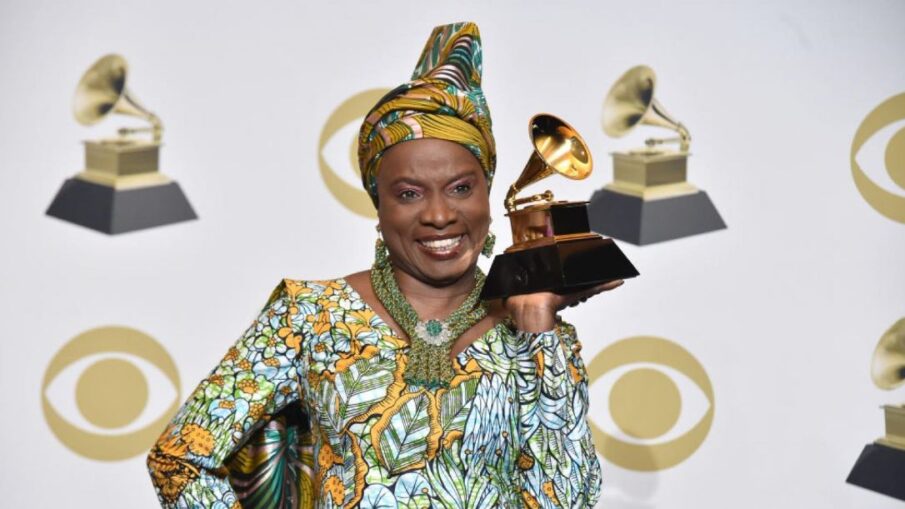Angélique Kpasseloko Hinto Hounsinou Kandjo Manta Zogbin Kidjo wa born on the 14th of July 1960, she is a Beninese-French singer-songwriter, actress and activist noted for her diverse musical influences and creative music videos. Kidjo was born into a family of performing artists. Her father was a musician, and her mother worked as a choreographer and theatre director. Kidjo was born in Ouidah, French Dahomey, in what is now Benin. Her father is from the Fon people of Ouidah and her mother from the Yoruba people, She grew up listening to Yoruba and Beninese traditional music. By the time she was six, Kidjo was performing with her mother’s theatre troupe, giving her an early appreciation for traditional music and dance. Kidjo is fluent in five languages: Fon, French, Yorùbá, Gen (Mina) and English.[13] She sings in all of them, and she also has her own personal language, which includes words that serve as song titles such as “Batonga”. “Malaika” is a song sung in the Swahili language. Kidjo often uses Benin’s traditional Zilin vocal technique and vocalese. Kidjo married French musician and producer Jean Hébrail in 1987. Their daughter Naima was born 1993 in France.
FOUR
Agolo
“Agolo” by Angélique Kidjo is one of her most celebrated songs, known for its dynamic fusion of African rhythms, funk, and contemporary pop elements. Released as part of her 1994 album Aye, the track emphasizes environmental conservation and the interconnectedness of humanity and nature, reflecting Kidjo’s commitment to social issues through music. It has garnered 7.6M views on it’s Official Music Video on YouTube and over 163k streams on spotify. The song earned critical acclaim and was nominated for a Grammy Award in the Best Music Video category in 1995, further cementing Kidjo’s status as a global music icon. Its vibrant music video and energetic performance style contributed to its widespread popularity, making “Agolo” a standout track in her career and a lasting symbol of her artistic versatility and activism.
FYI
Angelique Kidjo has collaborated with many artists including Bono, Branford Marsalis, John Legend, Jimmy Buffett, Peter Gabriel, Alicia Keys, Carlos Santana, Josh Groban, Philip Glass, Sting, Ziggy Marley, Yemi Alade, Burna Boy, Johnny Clegg, Dave Matthews, Tina Turner, Alpha Blondy and Davido.
THREE
Do Yourself ft. Burna Boy
“Do Yourself” features African Giant, Burna Boy who did justice to the fantastic track. The song is a track off her 2021 Grammy-winning Album, “Mother Nature“. It’s a celebration of African pride and self-reliance, with Kidjo’s energetic vocals and Burna Boy’s modern Afro-fusion style. It has garnered over 1.9M views on it’s Official Music Video on YouTube. “Do Yourself” is a vibrant Afrobeat track by Angélique Kidjo featuring Burna Boy, released in 2021. The song is part of Kidjo’s Grammy-winning album Mother Nature. It’s a celebration of African pride and self-reliance, blending Kidjo’s signature energetic vocals with Burna Boy’s modern Afro-fusion style. The lyrics encourage self-determination, urging listeners to take control of their destinies rather than waiting for others to act. The track fuses traditional African rhythms with contemporary sounds, reflecting the artists’ shared Pan-African vision. The song received global acclaim for its message and infectious sound, earning a Grammy nomination for Best Global Music Performance in 2022. It’s a powerful anthem of resilience and empowerment.
TWO
Joy ft. Davido
Serving as Kidjo’s most recent releases is the track called Joy, and it features Nigeria’s all time Afrobeat star, Davido. Angélique Kidjo wrote, performed, and produced this new track. Released in December 2024, “Joy” has garnered over 2.5M streams on spotify and over 2.7M views on it’s Official Music Video on YouTube. This track was sung in both Yoruba and English and the lyrics emphasize themes of self-discovery, inner strength, and the pursuit of joy. “Joy” has been well-received, entering the Nigerian National Airplay charts at #7 and securing a Top 20 position in South Africa’s Airplay charts. Critics have praised the track for its impactful message and potential for international recognition, with some describing it as “Grammy-worthy.”
AWARDS/RECOGNITIONS
- From the 90s till this very day, Angélique Kidjo has been a recipient of multiple awards and recognitions.
- To name a few recognitions, Kidjo is the first woman to be listed among “The 40 Most Powerful Celebrities in Africa” by Forbes magazine. Kidjo has received honorary doctorates from Yale University, Berklee College of Music, Middlebury College and UCLouvain.
- On January 27, 2020, Kidjo won the Grammy for Best world music album at the 62nd Annual Grammy Awards, making it her 4th Grammy award.
- On November 21, 2024, Kidjo received the “SDG Vanguard Award” from the United Nations Foundation in New York.
DISCOGRAPHY
- Kidjo has numerous albums from 1981 up until 2021.
- These are her most recent body of work:
- Remain in Light (2018)
- Celia (2019)
- Mother Nature (2021)
ONE
We Are One
“We Are One” is a song performed by Angélique Kidjo for Disney’s 1998 film The Lion King II: Simba’s Pride. Composed by Tom Snow with lyrics by Marty Panzer and Jack Feldman, the song underscores the film’s central theme of unity and interconnectedness within the circle of life. In the movie, it is sung by Simba to his daughter, Kiara, to impart lessons about their responsibilities and the bonds that tie all living creatures together. Kidjo’s rendition of “We Are One” is featured on the album Return to Pride Rock, which includes songs inspired by the film. Her version uniquely blends English lyrics with Fon, a language from her native Benin, adding an authentic African essence to the track. This fusion highlights Kidjo’s commitment to promoting African cultures through her music. It has garnered over 4M streams on spotify and over 1M views on its official music video on YouTube. The song has been praised for its uplifting message and melodic composition, contributing to the enduring appeal of The Lion King franchise’s music.



